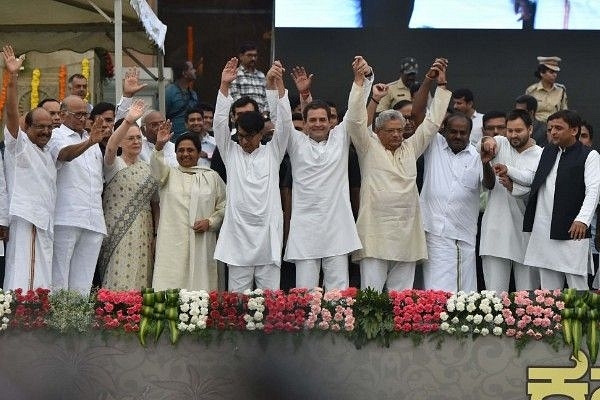
Anti-Modi Coalitions Serve No Purpose Unless Their Agenda Is To Federate India
Modi himself, having been a chief minister, should move India towards becoming a more decentralised federation.
If he does that in his second term, he would have done India, and its constituting states, a huge favour.
If the final election results are not too different from what the exit polls have predicted – a return of the National Democratic Alliance (NDA) to power – the opposition has much to introspect about. The issue is not about who won or who lost, and why, but to figure out what an alliance of diverse political parties should stand for. Without this clarity, it would not matter even if a rag-tag coalition came to power, as it did in 1996-98. It cannot last.
Right now, the mahagathbandhans, wherever they have been formed (Uttar Pradesh, Bihar, Karnataka, Jharkhand), have no real agenda beyond ousting Narendra Modi from power. But while this kind of narrow agenda may work sometimes – as it did in 1977, when the imperative was to get rid of Indira Gandhi after the Emergency – in most other years there is no compelling reason for the voter to think he should vote for someone’s ouster just because a bunch of opposition leaders don’t like him or her.
Given the diverse nature of our polity, coalitions may well be the norm once the occasional tall leader passes into history (Nehru, Indira Gandhi, and presumably Modi after 2024). But if they are to achieve anything when they are in power, such coalitions must also have a positive programme.
This is particularly relevant when there may be no broader national party providing the ideological and leadership glue to hold disparate factions of regional parties together. The Congress party seems to be on the verge of another collapse, and this means there can be a BJP-led coalition to lead one side, but the other side will only have a large aggregation of regional parties, each with no greater mandate to govern than in his or her own state.
What, for example, is Mayawati’s claim to national leadership even if she gets all of 30-35 seats? What, for that matter, is the value of having a Mamata Banerjee or K Chandrashekar Rao or Chandrababu Naidu as the head of a future regional party-led United Front in Delhi, if this grouping has no agenda whatsoever once it comes to power?
If the idea is to put weak leaders without much of a base as the head – as was the case with H D Deve Gowda in 1996 and I K Gujral in 1997 – there is no reason whatsoever for the voter to consider having them in power. They will remain stop-gap arrangements.
The current confabulations of Chandrababu Naidu, whose own power base in Andhra Pradesh does not appear any safer than Humpty-Dumpty’s, to cobble together an opposition front with no agenda is more likely to result in chaos than effective governance. It will be devoid of any higher purpose beyond putting Modi out to grass.
The larger question is: what common agenda can regional parties develop, when they have no common political or economic interest beyond their own states to hold them together?
The answer could be this: their objective should be to devolve more power to states, so that a future coalition at the Centre has limited powers. The Prime Minister’s job can be done by almost anyone, even by rotating the job among various leaders, something like the European Union Presidency which rotates every six months.
If the job of the Centre (and the PM) is limited to defence, inter-state internal security, the higher judiciary, currency, fiscal and macro-economic stability, telecommunications and such-like subjects that can only be centralised, the vast bulk of the work in these areas can be done through independent institutional frameworks that can support any PM or his ministers, even if they do not last too long in their jobs. The cabinet then will not have the power to dole out large favours to one segment of society or another, or have the power to impose new taxes that have a large nation-wide impact, except in emergencies like war. Large existing central schemes and the resources involved can easily to pushed down to the state level. Finance commissions can anyway apportion resources between Centre and states every five years, and institutions like a National Security Agency, the defence forces, the Reserve Bank, and a new fiscal authority can do the rest of the work fairly autonomously, except for infrequent policy interventions when needed.
A super-federated India will essentially be a European Union without the fiscal and monetary problems. We are federating downwards from a situation of over-centralisation, whereas the EU has tried to do the job in reverse, where powerful states were asked to reduce their own sovereign powers and centralise them at the level of the EU. It is far easier to devolve power from the top down, given political will, than to do it upwards.
In the current constitutional framework, you can’t prevent a strong national leader from threatening the fiefs of states, no matter what you do to create a coalition of regional parties. The agenda thus needs to shift to a constitutional change that makes the PM less powerful, and the states more powerful. This ought to be the agenda of those who think Modi is the problem, when the problem is the Constitution.
If the mahagathbandhans of the future are united on the idea of devolving more powers to states, they would have no need to fight a Modi, who can become PM without having the power to interfere with their own priorities.
Modi himself, having been a chief minister, should move India towards becoming a more decentralised federation. If he does that in his second term, he would have done India, and its constituting states, a huge favour.